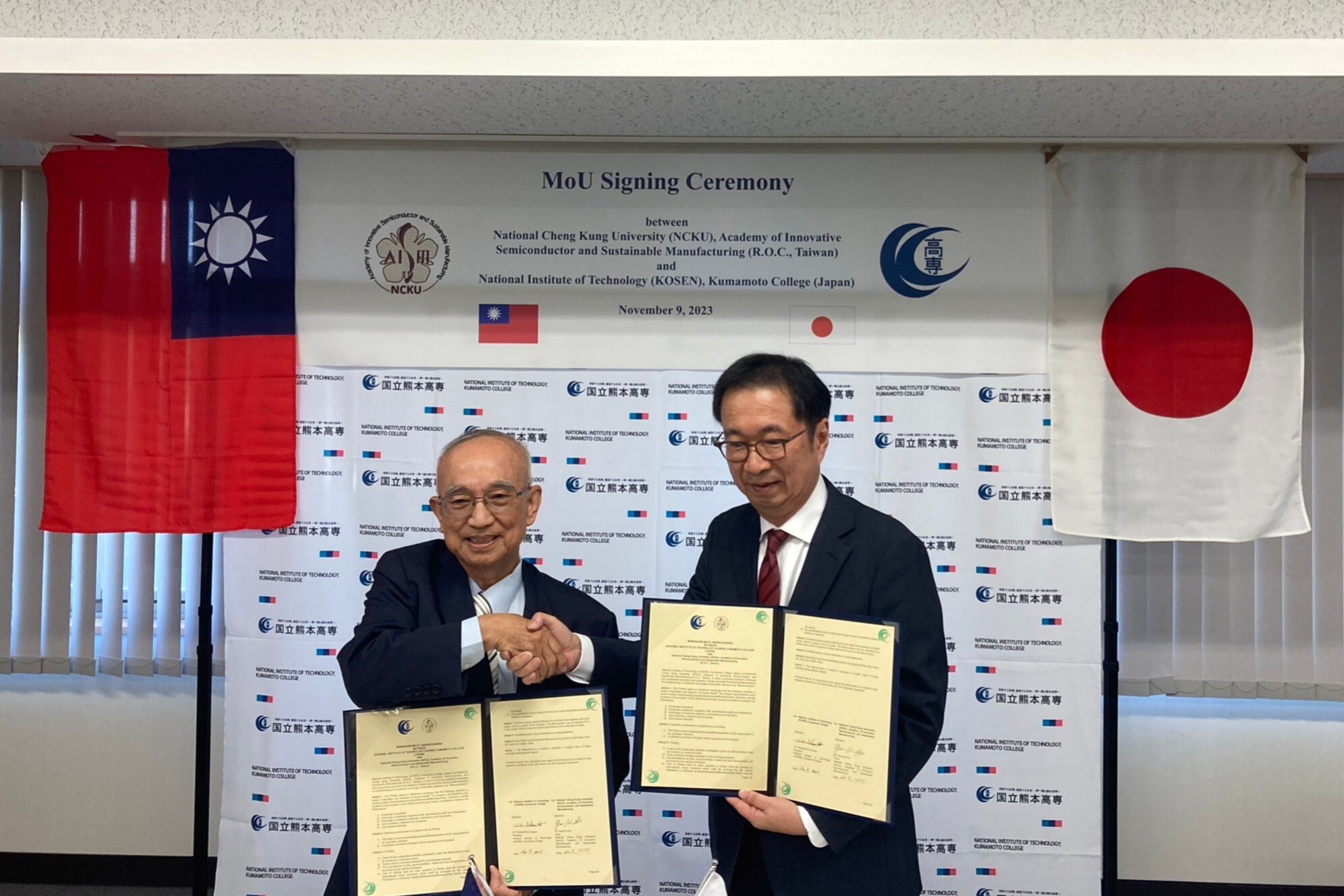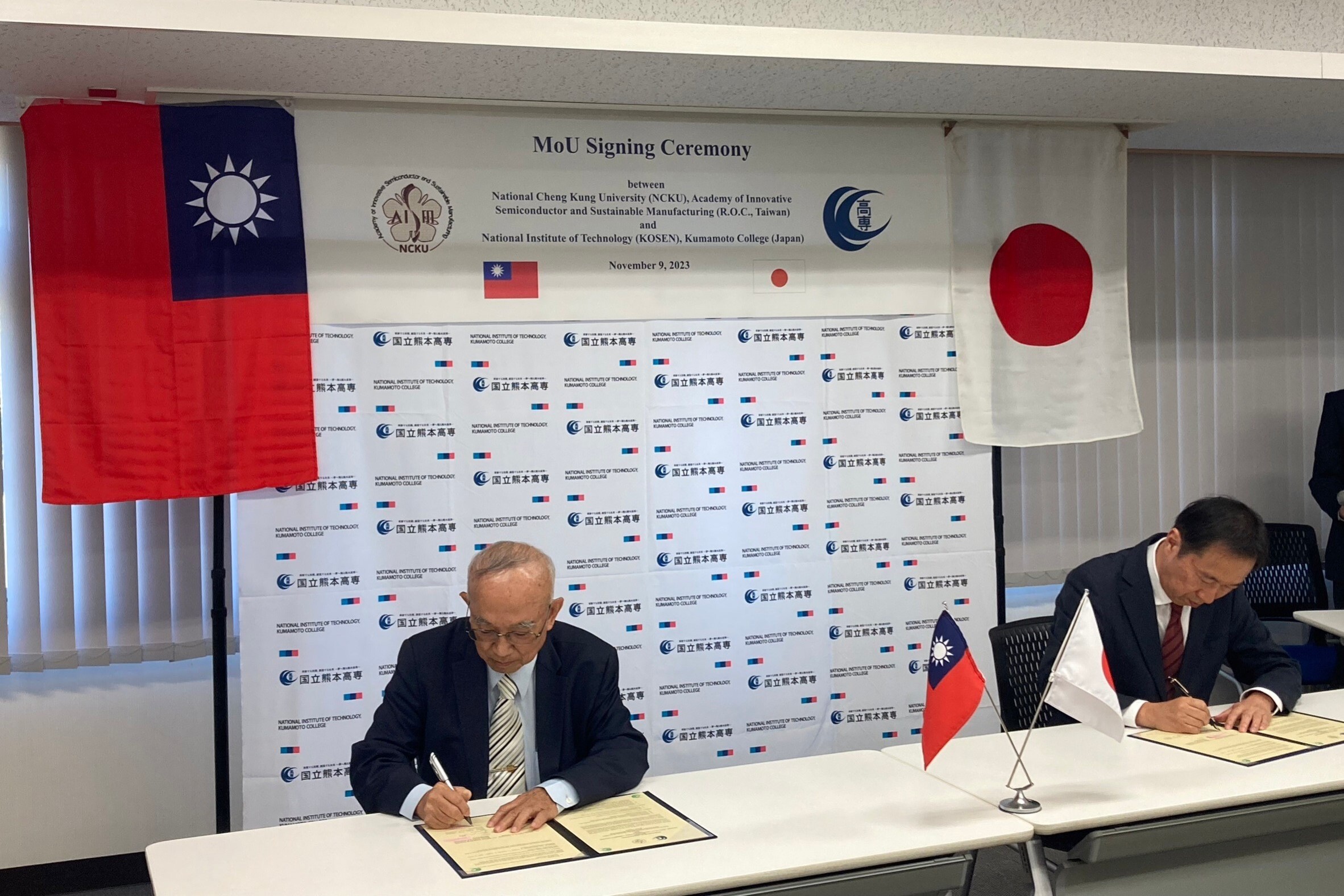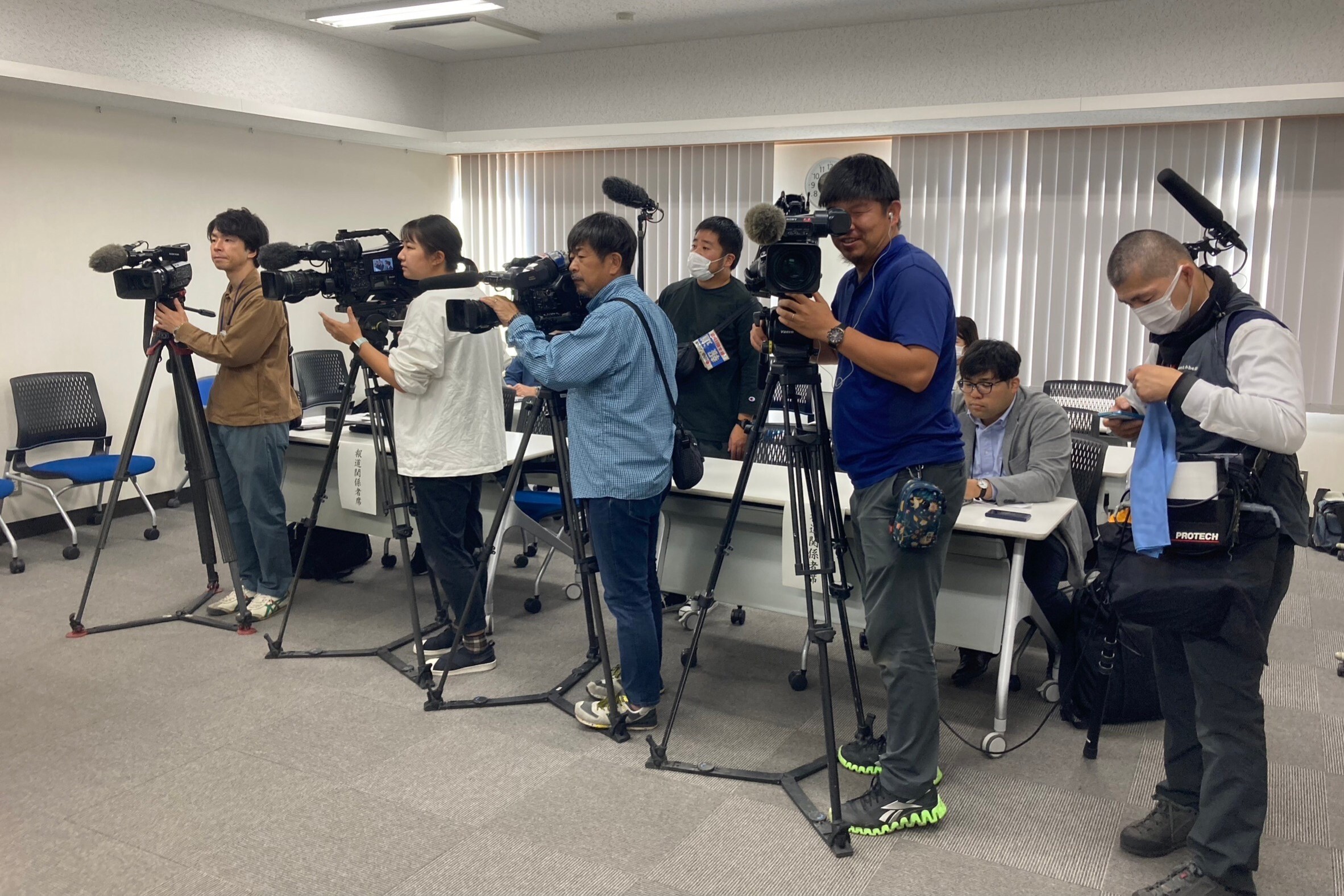AISSM of NCKU and Kumamoto National Institute of Technology Sign MOU for Taiwan-Japan Semiconductor Talent Cooperation
Written by Lin Yun-Mao. Image Credit to AISSM of NCKU.

The Dean of Academy of Innovative Semiconductor and Sustainable Manufacturing of NCKU, Su Yan-Kuin (left), and the President of Kumamoto National College of Technology, Hiroshi Takamatsu (right), signed a Memorandum of Understanding for academic exchange.
To enhance global engagement, the Academy of Innovative Semiconductor and Sustainable Manufacturing of NCKU (AISSM) signed a memorandum of understanding with Kumamoto National College of Technology on 9th, November. The agreement aimed to integrate the strengths and resources of both schools to develop courses on advanced technology, combine research resources, and cultivate highly competitive talent for local enterprises in Kumamoto. The ultimate goal was to establish a win-win situation for all parties involved.
Dean Su and President Takamatsu were the signatories at the signing ceremony held at Kumamoto National Institute of Technology. NCKU representatives in attendance at the signing ceremony included delegation members such as Liu Jui-Nung, Deputy Director of the Program on Semiconductor Manufacturing Technology , and Professor Jun Mizuno from the Program on Smart and Sustainable Manufacturing.

To foster future cooperation, Dean Su (left) and President Takamatsu (right) signed a Memorandum of Understanding.
As Dean Su stated in his speech, he was honored to represent AISSM at Kumamoto National Institute of Technology and sign the MOU on behalf of the organization. He viewed it as a promising start for international collaboration. In addition, he noted that direct flights would facilitate bilateral academic exchanges. He also pointed out that semiconductors and IC industry play a crucial role in the overall economy, since they cover aspects such as public livelihood, national defense, and the implementation of artificial intelligence. In his opinion, the signing of the Memorandum of Understanding opened a new chapter for both institutions, and he expected that this collaboration would enhance the academic and research achievements of both academies and provide increased opportunities for faculty and students to engage in meaningful exchanges.
President Takamatsu expressed his gratitude for the AISSM delegation's special visit to Kumamoto for the MOU signing. He also mentioned the ongoing construction of a new TSMC semiconductor fabrication plant in Kumamoto, which scheduled for mass production in 2024. Additionally, daily direct flights between Kumamoto and Taiwan have been available since this fall. In the end, the President conveyed his honor in signing the MOU with AISSM and expressed his hope for a long-term and robust collaboration between the two academies in research and academia.

This cooperation attracted enthusiastic coverage from Japanese Media.
The media representatives attending the signing ceremony expressed their interest in AISSM and asked many questions. The NHK reporter inquired about the founding date of the academy and whether it was classified as a postgraduate or an undergraduate institution. The reporter of Nikkei inquired whether it was the first time the academy to established an international cooperation agreement. As for the reporter from Asahi Broadcasting Corporation (ABC) TV, the focus was the subsequent course plans, including the course design, the summer school program, and how NCKU's resources would be integrated into the courses. And last, the TV Kumamoto reporter asked the appropriate Japanese term to refer to the academy.
The memorandum includes the research exchange, student exchange programs, and short-term internships. Kumamoto National Institute of Technology is renowned for its expertise in engineering education. To obtain a bachelor's degree, students are required to complete the five-year Regular Courses, followed by an additional two-year Advanced Courses. For Japanese students, AISSM at NCKU offers master's and doctoral programs, providing opportunities for advanced studies. Taiwanese students, on the other hand, can participate in short-term internships with companies in Kumamoto. These opportunities enable students from both sides to cultivate international competitiveness and gain exposure to the latest trends in the industry. In August of this year, Associate Professor Kenichiro Takakura, from the Department of Information, Communication, and Electronic Engineering at Kumamoto National Institute of Technology, led a student group to participate in the 2023 NCKU AISSM Summer School in Tainan, Taiwan.
The industrial cluster of semiconductor-related industry in the Kyushu region of Japan began to take shape in the 1980s. Today, it comprises over 200 companies engaged in semiconductor equipment manufacturing and component production. In addition to the signing ceremony, the AISSM delegation visited Kumamoto University and TSMC's Kumamoto plant to explore potential collaborations among the three parties. This involved establishing direct communication channels and exploring opportunities for internships and employment.
In recent years, Kumamoto University has prioritized training semiconductor talent and has forged partnerships with the local semiconductor industry. The Faculty of Advanced Science and Technology (FAST) has established the Semiconductor Research and Education Center , in the spring of 2022, a base for nurturing specialized talents. In 2021, TSMC announced the construction of a manufacturing plant in Kumamoto, forming a joint venture with partners Sony and DENSO, the world's largest automotive components manufacturer. The mass production of the fab is scheduled to commence in the fourth quarter of 2024, with planned processes including 28nm, 22nm, 16nm, and 12nm. In the initial stage, the project is expected to generate approximately 1,700 jobs, with a total investment amounting to 1 trillion yen. One of AISSM's key resposibility is to develop national-level strategies for integrating economic,
NCKU's Academy of Innovative Semiconductor and Sustainable Manufacturing, established in October 2021, stands as Taiwan's first semiconductor college. The aim is to foster top and sustainable talents applicable to the whole spectrum of the semiconductor industry. The semiconductor industry is a crucial sector in Taiwan, and due to dynamic international circumstances and the industry's rapid growth, numerous companies have opted to establish factories overseas, leading to a substantial demand for talents skilled in technical development.
Provider:
NCKU News Center
Date:
2023-11-23